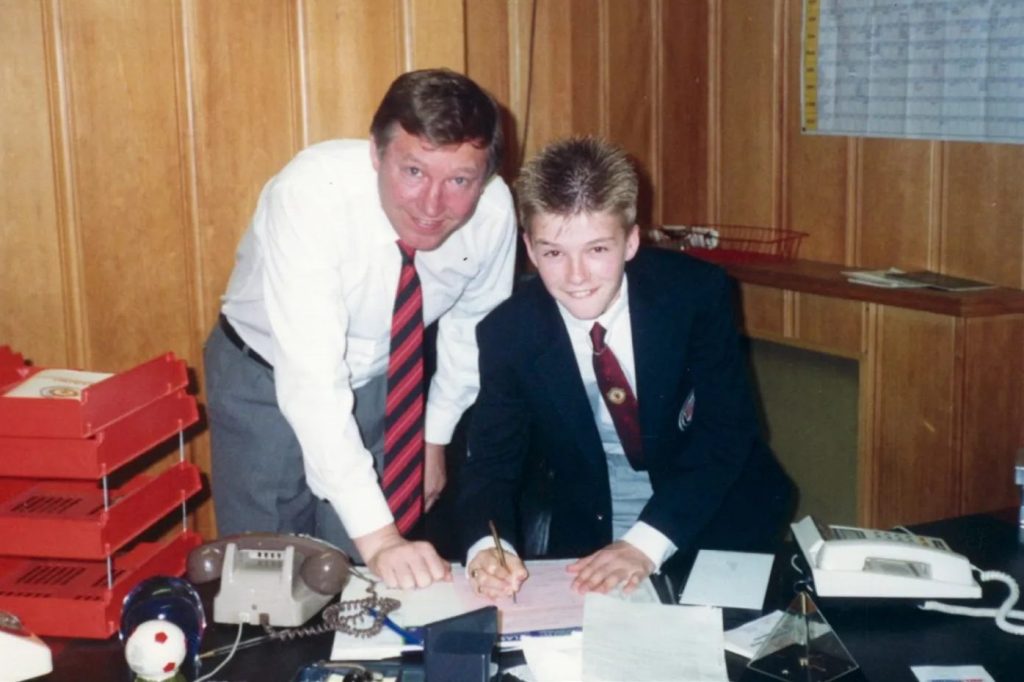If you’re not remotely interested in soccer or celebrities, I recommend Netflix’s four-part documentary series Beckham. Yes, I know it’s about a famous soccer player who happens also to be a celebrity and who, furthermore, is married to the famous model/celebrity/whatever who used to be in the world’s most famous girl band, the Spice Girls. But trust me, you’re going to be hooked.
One of the things that hooked me was the way it enables you to play catch-up on all the David and Victoria Beckham stories you pointedly ignored during the past three decades because, damn it, that pair were quite overexposed enough already without needing any of your attention wasted on whatever nonsense they’d got up to lately — Beckham’s goal, for example.
Beckham retires to his lovely home in the Cotswolds, smooching with his adoring wife to Dolly Parton
Previously my inexpert opinion on Beckham was that while he was probably a decent-ish player, he wasn’t nearly as good as the best ones (Zidane, Ronaldo, etc). But then I watched the footage of the amazing — nay legendary, I now learn — goal he scored while a twenty-one-year-old with Manchester United and realized: “No, hang on. Maybe some of the fuss was justified.”
The goal, against Wimbledon, was scored from the halfway line, which is unusual in football because by the time the ball has covered that distance there’s normally a goalie ready to stop it. Pele once tried this trick but never achieved it. Beckham succeeded because he’d been practicing for it his whole life. Self-confessedly thick academically and with zero interests beyond soccer, young David had spent every spare hour that God sent playing with his ball in his garden and learning to curve it on target with unerring accuracy. Hence that film title Bend It Like Beckham. Hence his popularity with his teammates because, with corners and such like, he was particularly good at placing the ball either in the net or in exactly the spot where someone else could put it in the net.
So, not just a pretty face. And also, someone very sure of his talents, and happy to take the occasional calculated risk. The risk here was that if his cheeky gamble failed he would undoubtedly incur the wrath of his scary boss/surrogate father figure Alex Ferguson, the gum-chewing tyrant who wanted all his players to live like monks, play as a team and submit to his every command. Even years on, his former protégés talk about “the Manager” with fear and reverence and terror that he might be lurking off camera waiting to storm in and bite their head off.
In the version of events presented here, Beckham was undone by his dedication to the beautiful, talented woman he’d fallen in love with when he’d first glimpsed her on TV, and courted assiduously on long Porsche journeys, even if she could only see him for ten minutes. But Ferguson wanted goal-scoring machines, not besotted, distracted, tired Romeos who, when not canoodling with pop stars, were preening themselves in hair-styling ads. It was the beginning of the end for Beckham and Man U, which was hastened when Ferguson chucked a football boot at his head, requiring stitches.
Beckham felt more wanted at his next home, Real Madrid, where he was part of a super-team of superstars — known as Galacticos, including Luis Figo, Ronaldo and Zidane — and lived his best life of quality bromance and possibly the odd bit on the side, including one Rebecca Loos. Posh, needless to say, wasn’t having it. America was much more her style, but unfortunately it was the one country in the world that didn’t do first-class soccer.
But it’s amazing how persuasive an intransigent wife and a deal supposedly worth $250 million can be. In return for having his mouth stuffed with gold and pleasing his wife, Beckham effectively agreed to be gelded and humiliated by signing up to Los Angeles Galaxy. This meant playing on trashy stadiums, with amateurish, ill-paid players who didn’t have the skill to take advantage of his glorious crosses. He must have felt like a unicorn penned in with retired Blackpool beach donkeys. I doubt the parties thrown for him by Tom Cruise and Will Smith quite compensated.
After a bit more to-ing and fro-ing, including a brief stint at AC Milan which reminded him what he had sacrificed, Beckham retires to his lovely home in the picturesque rolling hills of Britain’s Cotswolds where he divides his time between beekeeping, eating delicious morsels he has cooked on his beloved grill and smooching with his adoring wife to Kenny Rogers and Dolly Parton singing “Islands In the Stream,” while their gorgeous, well-balanced, better-spoken children squirm lightly in the distance.
I’m sure some of this stuff is true. But how much you can’t be sure because the series was executive produced by the Beckhams, was made by a man — Fisher Stevens — who is evidently a close friend and has carefully burnished and whitewashed that it has even gone to the trouble of showing faked, amended versions of the newspaper reports on David’s love affair, giving the impression that it may not have happened.
Still, it makes a jolly enjoyable fairy story with a heartwarming ending and a moral which says that if you put family first you’ll live happily ever after.
This article was originally published in The Spectator’s UK magazine. Subscribe to the World edition here.






















Leave a Reply